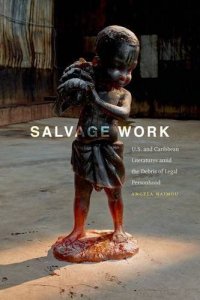
Ebook: Salvage Work: U.S. and Caribbean Literatures amid the Debris of Legal Personhood
Author: Angela Naimou
- Tags: Law Administrative Biographies Business Constitutional Criminal Dictionaries Terminology Environmental Natural Resources Estate Planning Ethics Professional Responsibility Family Foreign International Health Medical Intellectual Property Practice Legal Education History Self Help Theory Systems Media the Philosophy Rules Procedures Specialties Tax United States African American Asian Hispanic Regional Cultural Criticism Literature Fiction Caribbean Latin Race Relations General Discrimination Rac
- Year: 2015
- Publisher: Fordham University Press
- Edition: 1
- Language: English
- pdf
Salvage Work examines contemporary literary responses to the law's construction of personhood in the Americas. Tracking the extraordinary afterlives of the legal slave personality from the nineteenth century into the twenty-first, Angela Naimou shows the legal slave to be a fractured but generative figure for contemporary legal personhood across categories of race, citizenship, gender, and labor. What emerges is a compelling and original study of how law invents categories of identification and how literature contends with the person as a legal fiction. Through readings of Francisco Goldman's The Ordinary Seaman, Edwidge Danticat's Krik?Krak!, Rosario Ferre's Sweet Diamond Dust (Maldito Amor), Gayl Jones's Song for Anninho and Mosquito, and John Edgar Wideman's Fanon, Naimou shows how literary engagements with legal personhood reconfigure formal narrative conventions in Black Atlantic historiography, the immigrant novel, the anticolonial romance, the trope of the talking book, and the bildungsroman.
Revealing links between colonial, civic, slave, labor, immigration, and penal law, Salvage Work reframes debates over civil and human rights by revealing the shared hemispheric histories and effects of legal personhood across seemingly disparate identities-including the human and the corporate person, the political refugee and the economic migrant, and the stateless person and the citizen.
In depicting the material remains of the legal slave personality in the de-industrialized neoliberal era, these literary texts develop a salvage aesthetic that invites us to rethink our political and aesthetic imagination of personhood. Questioning liberal frameworks for civil and human rights as well as what Naimou calls death-bound theories of personhood-in which forms of human life are primarily described as wasted, disposable, bare, or dead in law-Salvage Work thus responds to critical discussions of biopolitics and neoliberal globalization by exploring the potential for contemporary literature to reclaim the individual from the legal regimes that have marked her.
Revealing links between colonial, civic, slave, labor, immigration, and penal law, Salvage Work reframes debates over civil and human rights by revealing the shared hemispheric histories and effects of legal personhood across seemingly disparate identities-including the human and the corporate person, the political refugee and the economic migrant, and the stateless person and the citizen.
In depicting the material remains of the legal slave personality in the de-industrialized neoliberal era, these literary texts develop a salvage aesthetic that invites us to rethink our political and aesthetic imagination of personhood. Questioning liberal frameworks for civil and human rights as well as what Naimou calls death-bound theories of personhood-in which forms of human life are primarily described as wasted, disposable, bare, or dead in law-Salvage Work thus responds to critical discussions of biopolitics and neoliberal globalization by exploring the potential for contemporary literature to reclaim the individual from the legal regimes that have marked her.
Download the book Salvage Work: U.S. and Caribbean Literatures amid the Debris of Legal Personhood for free or read online
Continue reading on any device:

Last viewed books
Related books
{related-news}
Comments (0)